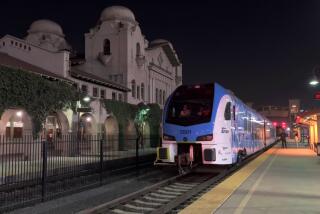Winding Tracks Take ‘Trains’ Through Two Centuries
- Share via
SANTA BARBARA — At the risk of derailing what plays like a promising but problematic work in progress, Barbara Lebow’s “Trains” is still not ready for the Metro line.
For the play’s initial West Coast stop at Santa Barbara’s Ensemble Theatre, Atlanta-based Lebow and director Frank Wittow, her longtime collaborator, used their in-residence rehearsal period to stoke their dramatic engine with new coals. Despite the revisions, however, the play’s parallel self-contained one-acts and their curious framing dialogue never find their way to a common track, despite suggestive thematic associations and the use of the same pair of actors in each segment.
The first story is a historical portrait of post-Civil War Americana in which a pampered, sickly Southern aristocrat (Joseph Gibson) undertakes a train journey from New Orleans to Montreal under the watchful guardianship of the family’s faithful retainer (Roscoe Freeman), a man of greater intelligence and integrity than his white “superiors.” Though there is genuine affection between them, it isn’t enough. In the course of their odyssey, the youth and his servant act out in microcosm the troubled dynamics of race relations that resonate to this day--prejudice, false assumptions and a tragic failure of communication.
The second tale is set among the homeless outcasts who haunt the train tunnels of present-day Trenton, N.J. A bitter vagrant (Freeman) who’s turned his back on the world has nothing but contempt for the idealism of a younger comrade (Gibson) who harbors dreams of reentering society. Played out in the hostile belly of the railway, where their friend has recently frozen to death, their dispute takes on the mythological overtones of Theseus and the Minotaur, without the comfort of a lifeline out of the labyrinth.
Both of Lebow’s “train” stories deal with populations that have fallen through the cracks in society, both involve a confrontation between age and youth, and in both one character attempts to break free from a cycle of defeat. The wide-ranging characters and settings showcase the versatility of the performers, the ingenuity of scenic designer Gary Wissman and the period flair of costume designer Barbara Lackner.
But the stories remain very distinct, despite the attempt to link them with a poetic framing dialogue between two mysteriously generic railroad inhabitants defined only as the life-affirming Younger Man (Gibson) and the cynical Older Man (Freeman), who recite a kind of elegy on the theme of trains and seem to be introducing--or reciting--the playlets.
Lebow and Wittow still haven’t solved the inherent vagueness in this conceit, and the relationship between these characters and the stories is frustratingly elusive. Moreover, the fundamental conceit about the symbolic import of the railroad remains suspect--Lebow’s rhapsodic verse in praise of choo-choos is precious to the point of pretension, an odd mix of MacLeish’s “J.B.” by way of “Engineer Bill.”
*
* “Trains,” Ensemble Theatre, 914 Santa Barbara St., Santa Barbara. Tuesdays through Saturdays, 8 p.m.; Sundays, 2 and 7 p.m. Ends May 7. $20-$28. (805) 962-8606. Running time: 2 hours, 15 minutes.
More to Read
The biggest entertainment stories
Get our big stories about Hollywood, film, television, music, arts, culture and more right in your inbox as soon as they publish.
You may occasionally receive promotional content from the Los Angeles Times.










